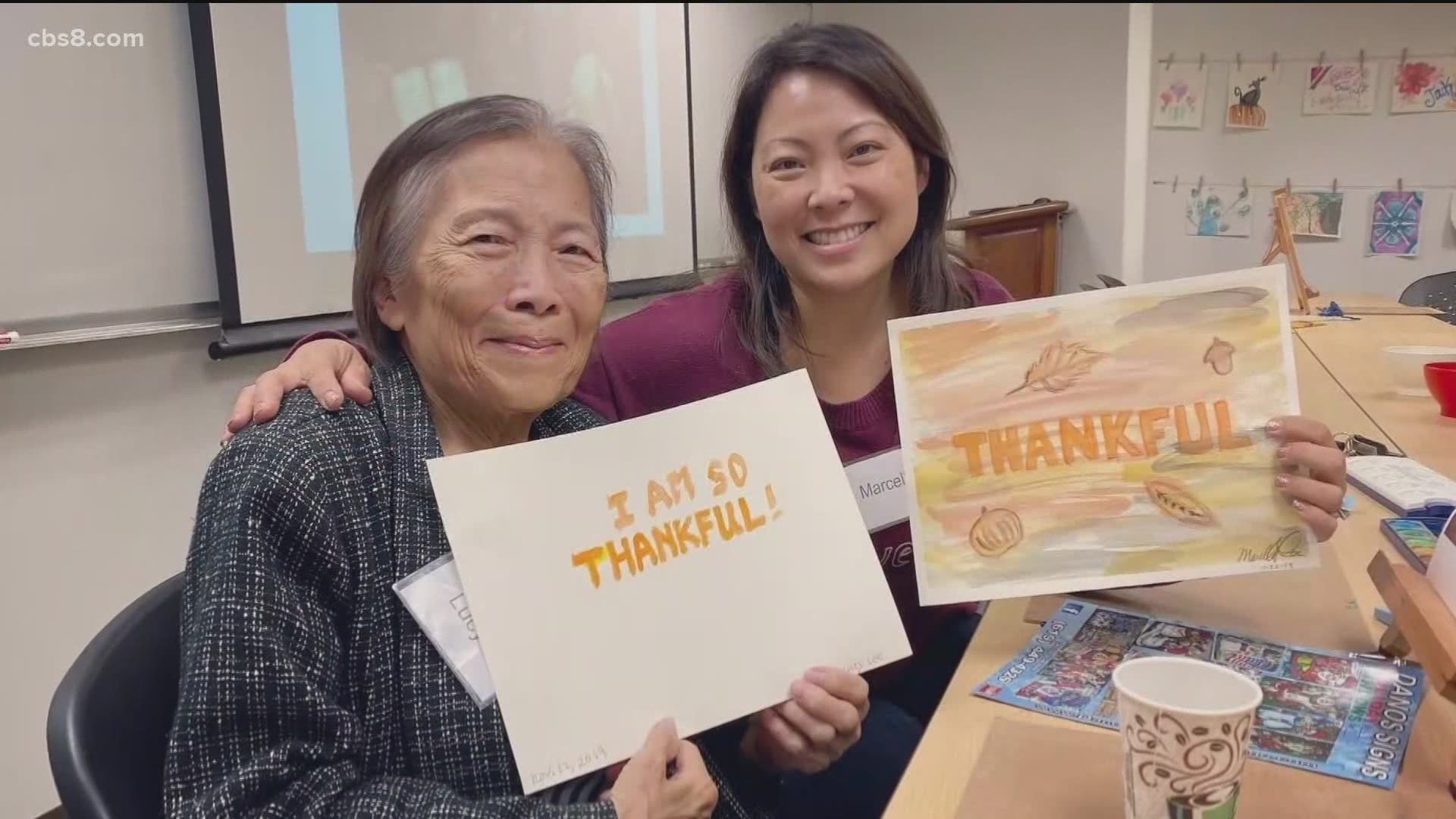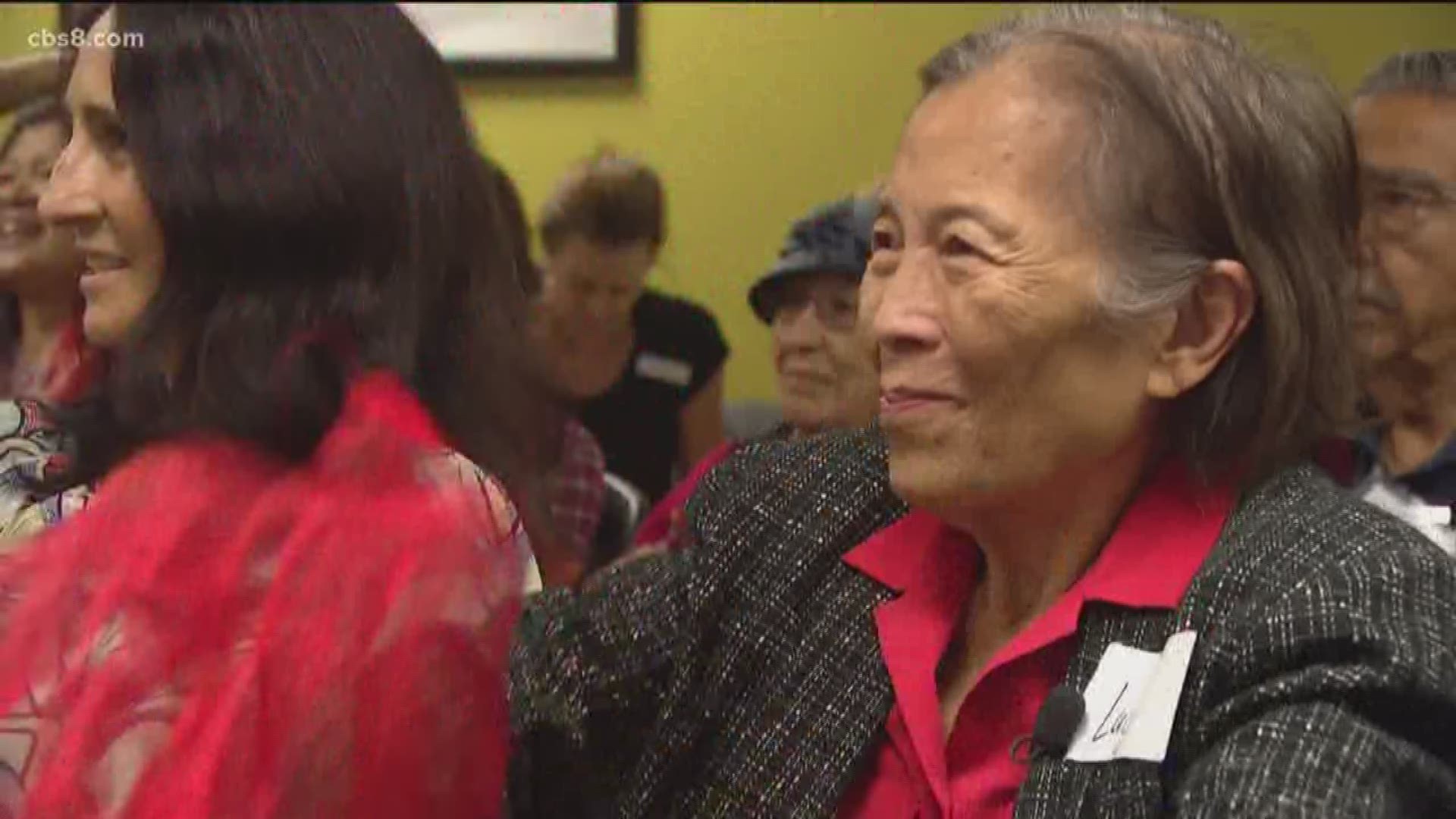SAN DIEGO — A local charity is celebrating a special milestone and we are taking a closer look at the impact it’s had on San Diego.
Five years ago, Alzheimer's San Diego opened its doors to help people with the disease and their families.
Since then, the charity has served more than 150,000 people and has helped fund local researchers in their quest to find more effective treatment, with the ultimate goal of finding a cure.
I have a personal connection to Alzheimer's San Diego. It was around this time last year when I first reached out to the nonprofit organization to learn more about the disease and the support it offers to Alzheimer's patients and families.
My mom, Lucy, had just been diagnosed with Alzheimer's disease and gave me her blessing to do a story about our journey, in the hopes of helping others also living with the disease:
Prior to the pandemic, my mom attended free music and art therapy classes at Alzheimer's San Diego. She has since continued virtual and socially-distanced visits with her Alzheimer's Companion volunteer, Claudia Mazanec.
Over the past five years, Alzheimer's San Diego has served more than 150,000 people, but the nonprofit doesn't just offer direct help to families. It also provides funding to local researchers.
"Sometimes, the little grants that we give bridge that gap to get them to that next step so they're able to apply for the NIH [National Institutes of Health] funding," said Eugenia Welch, President and CEO of Alzheimer’s San Diego.
The charity has helped fund more than a dozen research initiatives through Collaboration4Cure, which is part of San Diego County’s Alzheimer’s Project.
“In the five years we've been providing grant funding, we've given out about $1 million, which has translated into almost $9 million of additional funding from the NIH, which is great to be able to move those research projects forward,” Welch explained.
On this fifth anniversary of Alzheimer’s San Diego, local researchers are reflecting on the advancements made in unraveling the complex changes that take place in the brain and affect memory loss.
“There's been significant progress, I would say, over the last five years,” said Dr. Michael Jackson, a researcher with Sanford Burnham Prebys, is studying the effects of abnormal clusters of protein fragments, called amyloid plaques, and tangled bundles of fibers, called tau.
Jackson said the exact cause of Alzheimer’s disease is still unknown, but the effect is a chronic inflammation in the brain. The two predominantly used drugs to treat Alzheimer’s disease have been around for a long time, and they slow the progression in some people, but do not stop it altogether.
“I think that realistically, as we recognize in truly late onset Alzheimer's disease, where we know that the neurons that are involved in memory and learning have actually died and are lost, it seems unlikely you’re going to replace those cells. Right now, the science doesn’t point to that, and so our greatest hope is, in fact, to prevent any further advancement of disease. I think that is much more attainable for drugs. And obviously, the earlier you can catch that disease, the more impact such drugs would have,” Jackson said.
Dr. Robert Rissman, Professor of Neurosciences at UC San Diego, is studying the effects of stress on the brain.
“Alzheimer's disease itself is a stressful condition on your brain. So, it's not just stress that you might experience from the outside world, but as the disease process is going forward, it's stressful for your brain and that whole circuitry becomes overused and weakened,” he explained.
He said his project is focused on finding new molecules that interfere with the stress system, that have never really been looked at before.
“Previously, people had always looked at one part of the stress receptor and we're focusing on the other side, which is actually where stress peptides bind, so it's innovative,” he said.
Rissman said he is hopeful for a cure, but in the meantime, early diagnosis is key.
There's also research being done to see if a simple blood test could one day be used to accurately diagnose Alzheimer's, a disease which currently affects more than 5 million Americans and 84,000 people in San Diego.
Welch agreed that a proper diagnosis is highly important, so people can get treatment and support as early as possible. She recommends keeping the mind as active as possible and reaching out to Alzheimer’s San Diego for resources and support.
“Even with the diagnosis of dementia, people are able to live well as they go through this journey. We try to encourage people to look at all the things they can still do and can participate in, versus what they can't,” she said.
All of Alzheimer’s San Diego’s services, including calls with social workers and its Alzheimer’s Companion program, are free to those living with Alzheimer’s or other forms of dementia in the San Diego region.
The charity is grateful for donations that allow them to serve the community without charge. Through the end of 2021, there is a dollar for dollar match up to $30,000 for all donations. Visit www.alzsd.org for more information.


